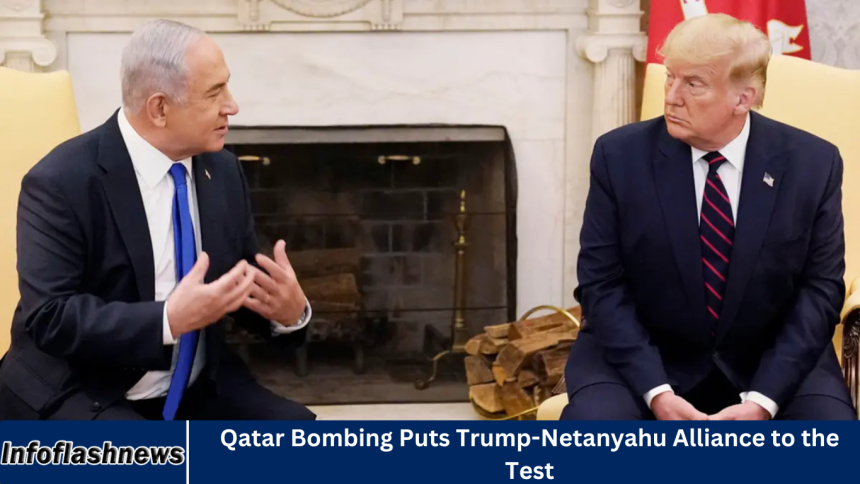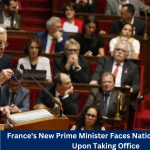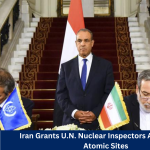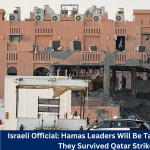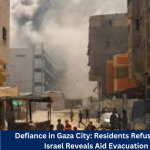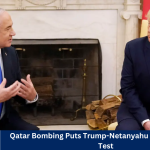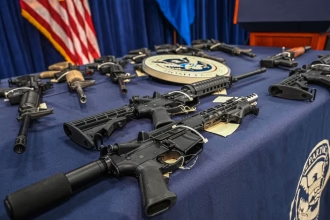The Middle East has long been a geopolitical tinderbox, and recent developments have once again thrust the region into the global spotlight. The Qatar bombing, a devastating incident with widespread regional implications, has not only shaken the fragile balance of power in the Gulf but also tested one of the most controversial and closely scrutinized political alliances of the 21st century — the Trump-Netanyahu partnership.
As former U.S. President Donald Trump and former Israeli Prime Minister Benjamin Netanyahu rose to power in parallel, their mutual interests, political styles, and hardline stances forged a powerful alliance that significantly shaped Middle Eastern policy. But the Qatar bombing, with its complex web of perpetrators, motivations, and consequences, may have pushed that alliance to its limits.
In this article, we’ll explore the key details of the bombing, analyze the Trump-Netanyahu alliance, and examine how this incident has strained or potentially reshaped their political and strategic legacies.
The Qatar Bombing: What Happened?
Overview of the Attack
In late 2025, a coordinated bombing in Doha, the capital of Qatar, claimed the lives of more than 75 civilians and injured hundreds. The attack targeted a busy commercial and diplomatic district, including proximity to the U.S. Embassy and major Qatari governmental buildings.
Who Was Behind It?
While no group immediately claimed responsibility, intelligence sources quickly pointed to a splinter faction of the Islamic State (ISIS), operating out of northern Iraq and eastern Syria. However, conspiracy theories and politically motivated narratives began to circulate — some accusing Iran-backed militias, others alleging Israeli covert operations, and still others hinting at internal Qatari political unrest.
These conflicting narratives only added fuel to an already tense geopolitical climate in the Gulf.
U.S. and Israeli Responses
The Trump Camp Reacts
Though out of office, Donald Trump remains a dominant figure in U.S. politics and conservative foreign policy discourse. His immediate response to the bombing was one of condemnation, blaming “radical Islamic terror” and accusing the Biden administration of “allowing the Middle East to spiral out of control.”
However, what drew attention was Trump’s statement implying that “certain Gulf states had been playing both sides,” a comment widely interpreted as a veiled jab at Qatar’s historic dual engagement with both the U.S. and extremist factions for diplomatic leverage.
Netanyahu’s Response
Benjamin Netanyahu, who returned to power in Israel’s 2024 elections, issued a statement expressing solidarity with Qatar but focused more heavily on the Iranian threat. He suggested that the bombing could be linked to Tehran’s expanding influence in the Gulf, warning of a growing “Axis of Terror” encompassing Iran, Hezbollah, and Hamas.
Notably, Netanyahu’s message did not align perfectly with Trump’s rhetoric, marking the beginning of what many analysts saw as a divergence in messaging and interests.
A Once-Unbreakable Alliance
The Origins of the Trump-Netanyahu Partnership
Trump and Netanyahu’s alliance wasn’t just political — it was ideological. Both leaders embraced nationalism, opposed globalism, and positioned themselves as strongmen fighting against a perceived liberal elite. On Middle East policy, they were in lockstep:
-
Jerusalem recognition as Israel’s capital (2017)
-
Abraham Accords, normalizing relations between Israel and several Arab states
-
Withdrawal from the Iran Nuclear Deal (JCPOA)
This cooperation fundamentally shifted U.S. policy in the Middle East and emboldened Netanyahu’s domestic and regional agenda.
Shared Interests
Their bond was rooted in mutual gain:
-
Trump garnered evangelical and pro-Israel support.
-
Netanyahu gained unprecedented U.S. support and regional legitimacy.
They projected an image of unity against Iran, terrorism, and Palestinian statehood movements.
Fractures Exposed by the Qatar Bombing
Qatar’s Geopolitical Role
Qatar has long walked a tightrope. It hosts the largest U.S. military base in the Middle East (Al-Udeid Air Base), maintains strong ties with Turkey, and has at times opened channels with Iran and Hamas. It’s also a significant gas exporter, making it economically powerful.
To Trump, Qatar’s duplicity was a liability. But Netanyahu’s stance is more complex. While Israel and Qatar have no formal diplomatic relations, Qatari funds have been instrumental in stabilizing Gaza, indirectly benefiting Israeli security.
This divergence in approach became apparent after the bombing.
Disagreement Over Iran and Qatar
Trump’s hardline rhetoric blamed Qatar’s engagement with Islamist factions, while Netanyahu framed the bombing within his larger anti-Iran campaign. This divergence suggests:
-
Trump wants to pressure Qatar into choosing sides.
-
Netanyahu sees Qatar as a potential stabilizing actor in Gaza, and possibly in future regional diplomacy.
This nuanced difference reveals strategic incompatibilities between the two leaders’ long-term visions.
Domestic Political Calculations
Trump’s 2026 Campaign Considerations
As Trump eyes a potential political comeback in the 2026 midterms or 2028 presidential race, foreign policy will be a key differentiator. He is likely to use the Qatar bombing to portray himself as a strong leader who “kept the Middle East in check,” contrasting with Biden’s foreign policy record.
Netanyahu’s Political Balancing Act
Netanyahu faces an increasingly polarized electorate and relies on coalitions with far-right and ultra-Orthodox parties. He must balance maintaining U.S. support (from either party) with avoiding escalation that could damage Israel’s fragile regional relationships — including tacit understandings with Qatar.
These domestic pressures may force each leader into positions that conflict with the other’s goals, further testing their alliance.
Regional Implications
Impact on the Abraham Accords
The Abraham Accords, a key Trump-Netanyahu achievement, could face strain. Qatar was never part of the Accords but was seen as a potential future partner. The bombing, and the fallout between Trump and Netanyahu’s differing interpretations, could discourage Qatari rapprochement with Israel.
Iran’s Position
Iran has seized on the opportunity to paint both Trump and Netanyahu as destabilizing figures. The lack of a unified narrative from the former allies allows Tehran to frame the bombing as a consequence of “Western imperialism” and regional mismanagement.
Media and Public Reactions
Western Media Coverage
Western outlets have largely focused on the humanitarian aspect of the bombing while highlighting the geopolitical implications. Many analysts note the growing disconnect between former allies Trump and Netanyahu, suggesting it may impact future U.S.-Israeli cooperation, particularly if Trump returns to power.
Israeli and Arab Media
-
Israeli media has been divided, with right-wing outlets defending Netanyahu’s cautious response and centrist outlets pointing out his drift from Trump’s more aggressive stance.
-
Arab media, particularly in Qatar and its allies, has criticized both leaders for past policies that may have contributed to regional instability.
Long-Term Strategic Fallout
Erosion of a Power Alliance?
While the Trump-Netanyahu alliance was built on mutual benefit and shared ideology, the Qatar bombing has highlighted their diverging priorities:
-
Trump favors binary, high-pressure diplomacy.
-
Netanyahu must navigate a multi-polar regional strategy.
This difference could mark the beginning of a more independent Israeli foreign policy, particularly if Netanyahu sees that aligning too closely with Trump’s rhetoric could damage Israel’s long-term strategic goals.
The Future of U.S.-Israeli Relations
If Trump were to return to power, his cooling relationship with Netanyahu could alter the dynamic. Would Trump support a Netanyahu rival who aligns more closely with his worldview? Would Netanyahu pivot toward more regional autonomy?
These questions may redefine the U.S.-Israel alliance in the coming decade.
Frequently Asked Question
What happened during the Qatar bombing?
The Qatar bombing was a coordinated terrorist attack in Doha that resulted in over 75 civilian deaths and hundreds of injuries. The blast targeted a high-security zone near diplomatic and governmental buildings. Though no group officially claimed responsibility, intelligence reports suggest possible links to extremist factions operating in the Middle East.
Why is the Qatar bombing significant to the Trump-Netanyahu alliance?
The bombing exposed growing differences between former U.S. President Donald Trump and Israeli Prime Minister Benjamin Netanyahu. While Trump blamed radical Islamist groups and indirectly criticized Qatar’s foreign policy, Netanyahu focused on Iran’s involvement — revealing divergent geopolitical strategies and testing the unity they once shared.
How did Donald Trump respond to the Qatar bombing?
Donald Trump condemned the bombing and criticized Qatar’s historical ties with extremist factions. He also blamed the Biden administration for what he described as weakening U.S. influence in the Middle East, contrasting it with his own administration’s hardline policies.
What was Benjamin Netanyahu’s response to the bombing?
Benjamin Netanyahu expressed sympathy for the victims but emphasized Iran’s growing threat in the region. Unlike Trump, he avoided directly criticizing Qatar, likely due to its indirect role in Gaza stabilization and broader regional diplomacy involving Israel.
What does the Qatar bombing reveal about U.S.-Israel relations?
The event highlights emerging fractures in U.S.-Israel relations, particularly if Trump returns to power. While historically aligned, Trump and Netanyahu now appear to have conflicting views on regional alliances, especially concerning Qatar’s role in Middle Eastern geopolitics.
Could the Qatar bombing impact the Abraham Accords?
Yes, the bombing and subsequent diplomatic fallout may hinder efforts to expand the Abraham Accords. Qatar was considered a potential future partner in the normalization process, but heightened tensions and diverging narratives could delay or derail such initiatives.
Is the Trump-Netanyahu alliance still relevant in Middle East politics?
While still symbolically significant, the Qatar bombing suggests the Trump-Netanyahu alliance may be weakening. Shifting regional dynamics, internal political pressures, and differing responses to security threats indicate a possible reevaluation of their once synchronized foreign policies.
Conclusion
The Qatar bombing is not just another tragic event in a volatile region — it is a political and diplomatic litmus test. It has exposed cracks in the once rock-solid alliance between Donald Trump and Benjamin Netanyahu, revealing differences in strategy, narrative, and future ambition. As global power centers shift and the Middle East continues to evolve, the Trump-Netanyahu dynamic will remain a key storyline. Whether their alliance can withstand the pressures of changing geopolitics, domestic politics, and regional complexities remains to be seen. One thing is clear: the Qatar bombing has become a defining moment in the post-Trump presidency and Netanyahu’s latest tenure — one that may permanently reshape their political legacies and the geopolitical landscape they once sought to control.

